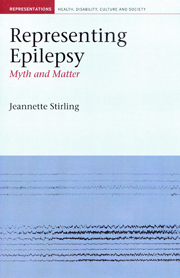Book contents
- Frontmatter
- Contents
- Acknowledgements
- Introduction
- 1 From Hippocrates to Shakespeare and Dickens: epilepsy's entry into ‘the circuit of culture’
- 2 Hystericity and hauntings: the female and the feminised
- 3 Notes from the borderlands: repressing the returned
- 4 The colonies
- 5 Because you're ‘you know. That way’
- Where to next? The ongoing story of epilepsy
- Bibliography
- Index
4 - The colonies
- Frontmatter
- Contents
- Acknowledgements
- Introduction
- 1 From Hippocrates to Shakespeare and Dickens: epilepsy's entry into ‘the circuit of culture’
- 2 Hystericity and hauntings: the female and the feminised
- 3 Notes from the borderlands: repressing the returned
- 4 The colonies
- 5 Because you're ‘you know. That way’
- Where to next? The ongoing story of epilepsy
- Bibliography
- Index
Summary
Oh give me land, lots of land, with the starry skies above – Don't fence me in.
(Cole Porter, ‘Don't fence me in’, 1942)At the close of the nineteenth century, ‘epileptic danger’ proved to be as much about economic viability as about hereditary contamination. In the industrialised spaces of a waning century, the epileptic figure acquired different meanings and connotations than had been evident in earlier systems of representation. Prognostications about epileptics meshed with capitalist narratives of maximum production, output and profit. Ideas of epileptic taint and epileptic disability became infused with those theories of temporal efficiency and scientific management that had become the organising principles of the factory floor. Defined by its unpredictability within this new social and representational matrix, the epileptic body could only be found wanting. Medical practitioners, social reformers and philanthropists in Britain and the United States argued that the only way to save mainstream society from the danger of its epileptic populations – and, indeed, the only way to save epileptics from the danger they presented to themselves – was through judicious and humanitarian confinement.
Confinement was to take the form of ‘labour colonies’, ‘farm colonies’ or ‘epileptic colonies’, as they were variously known. These were to be places where the epileptic could be isolated from social conditions such as an undisciplined lifestyle, the temptations of big-city living – specifically, alcohol and vice – and the economic penury thought to exacerbate the disorder.
- Type
- Chapter
- Information
- Representing EpilepsyMyth and Matter, pp. 131 - 177Publisher: Liverpool University PressPrint publication year: 2010

